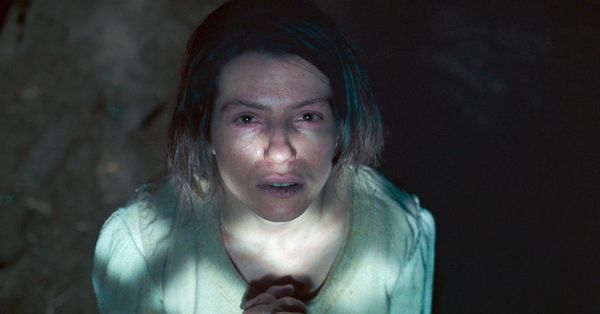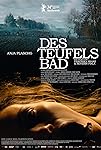Eye For Film >> Movies >> The Devil's Bath (2024) Film Review
The Devil's Bath
Reviewed by: Anne-Katrin Titze

Veronika Franz and Severin Fiala’s The Devil's Bath (Des Teufels Bad, a highlight of the 23rd edition of the Tribeca Festival), starring Anja Plaschg (who is also the composer as Soap&Skin) with Maria Hofstätter and David Scheid, shot by Martin Gschlacht (Silver Bear winner in the 2024 Berlin Film Festival) with costumes by Tanja Hausner (Jessica Hausner’s sister and longtime collaborator) is executive produced by Ulrich Seidl (Rimini and Sparta) and Bettina Brokemper (Margarethe von Trotta’s Ingeborg Bachmann - Journey Into the Desert, starring Vicky Krieps and Ronald Zehrfeld).
The horror in Veronika Franz and Severin Fiala’s third feature together (following Goodnight Mommy and The Lodge) is very much of this world and rooted in a belief system that brought hundreds of women “weary of this life” to commit acts of murder and confess, so as to be forgiven and spared eternal condemnation. Based on historical records from mid-18th century Upper Austria, The Devil’s Bath drops us into a rural society with strict codes governing the here and the hereafter. A baby cries, as its older brother conducts a shadow play on the laundry hung out to dry in the sun. He is called back into the house by an adult male voice, while the mother picks up the infant and walks with it through the forest up to a waterfall.
Agnes (Anja Plaschg), wearing a thick brown woolen sweater, braids a fragile wreath for her hair and wraps her precious collection of dried grasses, insects and shells into a kerchief. This is her wedding day and together with her mother, brother, and a chicken, they are off through the woods to celebrate. Wolf (David Scheid), the groom, drinks and laughs with his male friends until it is time to lead Agnes to their new abode, a gloomy old stone hut, dark and uninviting, and so costly that it ate up everything they had, including the dowry.
The new mother-in-law (a brilliantly menacing Maria Hofstätter) is a controlling force not only in this household, but in the village as well. She hands out the bread to the workers at the lake, one piece each, even for the very hungry or very pregnant. No mercy, it’s a tough life, she trains soft-hearted Agnes. “God won’t be happy if you don’t prepare your husband’s food in time” she warns and we can only imagine the life she led that made her this way. Agnes prays to a waxen baby Jesus in church for a child, all the while aware that a husband who doesn’t desire her won’t help matters.
A carp bone makes for a fine hair ornament, dishes are washed in a puddle outside, and blood in the brook tells others that a child is not on its way. Finding an animal skull in the water is bad luck and Agnes takes it all in, scratching her tongue until it bleeds. “Not being a local girl” makes her “a cross to bear,” they say. The barber, who fulfills the functions of doctor and medicine man, has remedies to drain the evil out, with the help of two holes in the nape of the neck and a small bundle of hair that is to be pulled back and forth to bring about infection. Leeches and rat poison and monarch butterflies escaping from the mouth, underlined by a festering sound design - The Devil’s Bath takes its frightfully factual shape.
A chopped-off finger or toe from an executed woman increases fertility. Cooking and recipes are timed by the length of prayers - three more pater nosters and the soup is done! The rules of the land and the superstitions of the day unfold at a steady pace, as Martin Gschlacht’s glorious and smart cinematography adds clarity here while sprinkling doubt over there. Tanja Hausner’s costumes speak of the historical past, and allow glimpses into the future, as when the protagonist, after an uneventful wedding night, looks for her husband while wearing the aforementioned sweater over a nightgown, making her look utterly modern.
By exploring the absurdity of constructions of belief in the past, we are invited to inspect those of the present.
Reviewed on: 16 Jun 2024
















